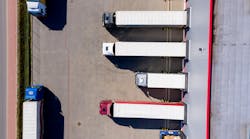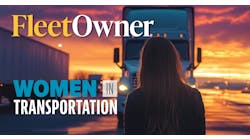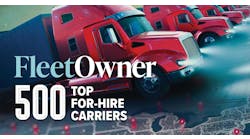As the economy continues to combat the impact of the COVID-19 pandemic, fleet executives must continue to do more with less and are tasked with increasing efficiencies, complying with regulatory mandates, meeting customer expectations, and saving money. Brian Holland, president and CFO of Fleet Advantage, shared his expertise about the buy versus lease debate, managing maintenance and repair (M&R) costs, as well as some of the biggest motivators for fleets to adopt new safety technologies.
FleetOwner: What type of fleets do you work with? And what are fleets' biggest concerns when they are looking to modernize their asset-management plan?
Brian Holland: Fleet Advantage works with for-hire and dedicated transportation fleets, however, it primarily provides services for private fleets within several industries, including 28 of the top 100 fleets in America.
Fleet Advantage’s philosophy looks at functional versus economic obsolescence, meaning how many years can fleets run their trucks versus how many years should they run their trucks by utilizing [tools that identify] the point at which a truck costs more to operate than to replace with newer equipment.
In recognizing the need for an optimum operational strategy to accomplish agile scalability (especially during the COVID-19 era), many fleets focused on innovative truck lease structures that offered shorter life cycles for their trucks. Shorter life cycles afford organizations the chance for drivers to operate newer, safer, more emissions-friendly trucks. As a result, many of these businesses are [experiencing] lower maintenance and repair costs, lower fuel expenditures, reduced emissions, and lower costs associated with accidents.
FO: Discuss the lease versus own debate. Is it more advantageous for fleets to lease their assets or own them, particularly in the COVID-19 era?
BH: It is evident by the cash flow in Fleet Advantage’s recent Lease vs Ownership Analysis that there is a significant cost-savings opportunity for organizations that switch to a shorter life cycle leasing procurement strategy. In addition, there is an after-tax advantage to leasing tractor equipment.
Fleet Advantage analyzed the total costs associated with purchasing an asset, including the upfront cost of the equipment, depreciation expense, tax expense, and the resale of the truck asset at the end of its useful life resulting in an immediate $67,714 cash outflow. In comparison, the total cash outflow associated with leasing a truck asset are the fixed annual costs in the form of lease payments resulting in a net present value of $62,182, leading to an after-tax advantage of $5,531 toward an organization’s bottom line.
FO: What are some of the biggest motivators for fleets to acquire new trucks?
BH: Safety, fuel economy, and the reduction of CO2 emissions. According to Fleet Advantage’s recent benchmark survey, 71% of transportation fleets have implemented blind spot mirrors as advanced safety features, while 66% have implemented front and rear disc brakes. Roughly 50% of fleets said their trucks are 2017 models or older (some fleets have as many as 3,000 trucks older than 2017 models).
This is critical since many OEMs have adopted advanced safety systems on 2018 and newer models as standard features, such as collision avoidance and lane departure warnings. Trucks that are 2017 models and older likely do not have these safety technologies and cannot be retrofitted with collision mitigation.
The survey also showed that 11% of fleets estimate they have saved more than $1 million in crash avoidance by upgrading to newer trucks with advanced safety features. These types of safety technologies have led to safer roads for drivers, passengers and other motorists, and have lowered accident costs. This is especially important since trucking fatalities recently reached the highest level in the past 30 years, with the average cost of each heavy-duty truck crash reaching $17.5 million.
More organizations are making changes to the life cycle of their trucks to benefit from newer units that offer more fuel efficiency and overall total cost of ownership (TCO). A recent analysis of truck life cycle data shows that fleet operators are now realizing a first year per-truck TCO savings of $16,856 when upgrading from a 2016 sleeper model-year truck to a 2021 model. Fleets can save $5,084 per truck in fuel in the first year, a 15% increase in fuel economy and reduction of CO2 emissions. Preserving a cleaner environment has again been in focus recently, with rules adopted by the Air Resources Board calling for the reduction of diesel truck exhaust in and around California’s ports.
FO: Maintenance and repair costs represent a large area of expense for fleets, and equipment that is not properly maintained can erode a fleet’s financial picture. How can fleets leverage data to make sure their assets are always up and running?
BH: The bottom line continues to drive many upgrade decisions, and fleet executives are paying closer attention to the costs associated with servicing an aging vehicle. Data and analytics play a significant role today in determining how and when to upgrade into newer trucks to reduce maintenance costs.
The industry’s changing mindset and shift toward newer trucks comes with a shift to replace trucks more frequently, which impacts M&R costs significantly. In a shorter life cycle program, the maintenance strategy turns to preventive rather than reactive (breakdowns and recovery). Additionally, when a fleet meets its warranty threshold, costs associated with that truck immediately spike, thus making shorter asset life cycles more cost-effective. Fleets that run their trucks on a seven-year life cycle instead of four years spend an additional $34,379 on maintenance per truck compared to four-year maintenance costs.
FO: What are your fleet customers’ thoughts when it comes to widespread adoption of electric and hydrogen fuel cell trucks?
BH: We believe many fleets are taking a wait-and-see approach to electrified technology. While there have been more news headlines discussing electric and hydrogen fuel cell Class 8 trucks, the benchmarking survey revealed that 30% said they do not see these widely in service for another 10 years (a year ago, 36% said they would not be widely used for another 10 years). Another 62% pointed to the same time frame for autonomous trucks. Only 3% of survey respondents believe autonomous trucks will be widely used by fleets within the next three years.
With that said, however, innovation changes everything. Forward-thinking fleets will be well positioned to take advantage of newer technologies as they become available and more mainstream.




